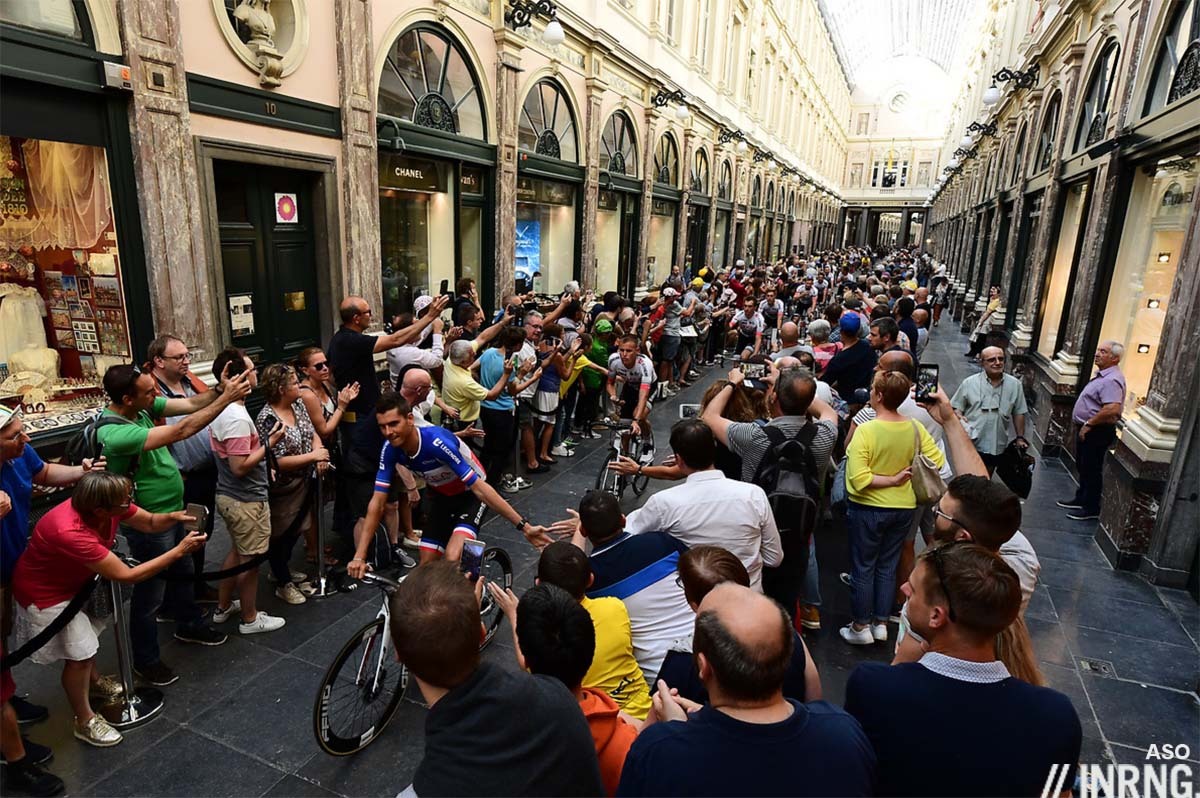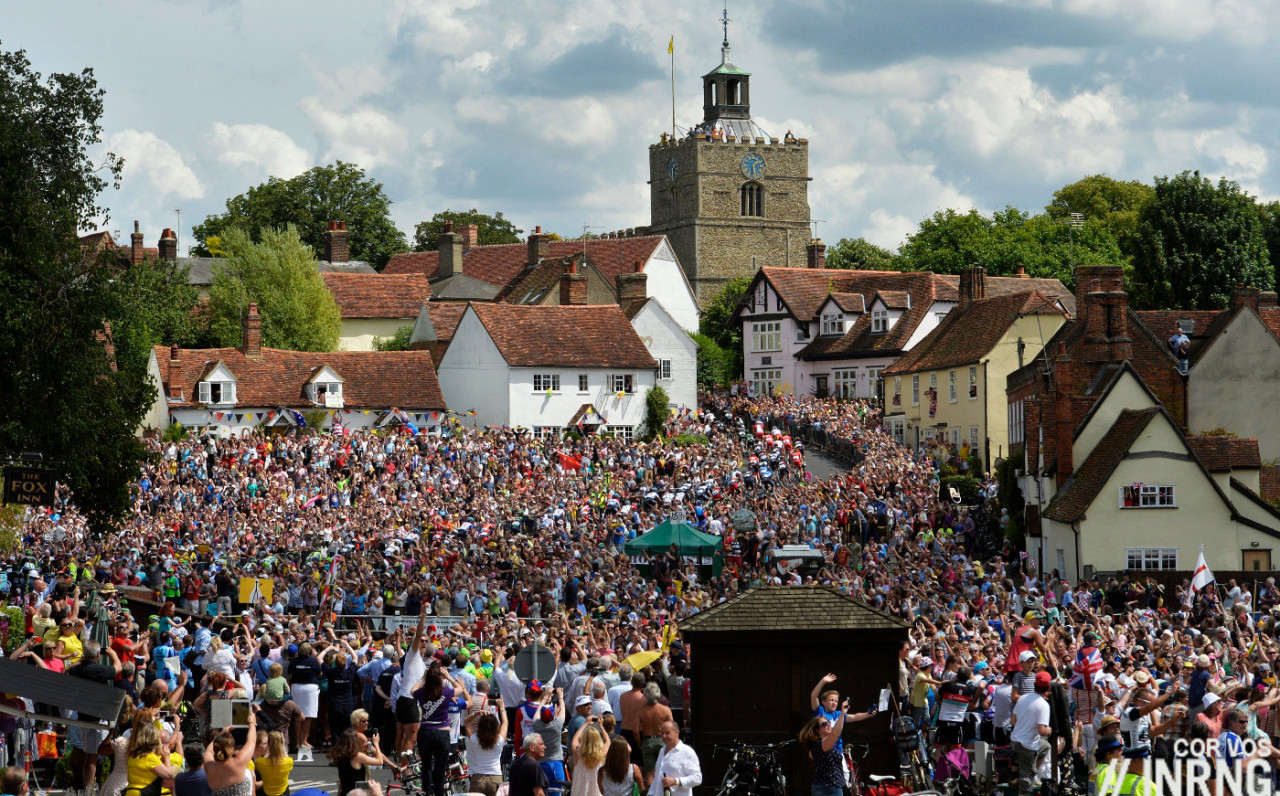The Tour de France starts in Italy. With the recent announcement that the 2026 edition will start in Barcelona foreign starts are now more than a curiosity, they’re almost the norm. The potential for big crowds and a chunky hosting fee make it an attractive option for the organisers.
Firenze is the 25th edition out of 111 to start abroad. Until the 1950s the race always started in Paris with one exception. The starts began to move elsewhere in the 1950s, around France but including Amsterdam as the first foreign start in 1954. West Berlin in 1987 and London in 2007 stand out.
This trend has accelerated. Half of starts this century are abroad and since 2014 we’ve had seven outside of France. Why? There’s a big demand with large cities and their regions keen to be in the spotlight, the Tour is a global media event. Live audiences for start to finish for the racing are bigger than other events but it’s the reach of the Tour, it gets on TV news bulletins and newspaper front pages in a way that other races don’t. This is valuable.
Plus there’s the logistics. If a foreign city wants the Tour, hosting start is obvious. Visiting Rimini and Emilia-Romagna is easy this weekend compared to mid-race; otherwise a city outside France has to be close so Brussels or Lausanne can work.

Money makes the wheels go round. Stages have their hosting fees and in 2019 the standard tariff was €70,000 for a stage start and €120,000 for a finish. For a grand départ it varies but that year Brussels reportedly paid a hosting fee of €5 million. That made the start more lucrative than all the other stages combined. You can see why it’s called a grand départ.
Also it’s not said out loud but while there might be up to 300 candidates to host a stage of the Tour de France, few willing to negotiate the large fee for the start. Plus mayors might like a finish one afternoon but a long weekend can be more controversial, good for hoteliers and restaurants but with road closures frustrating some locals and shopkeepers worried about takings.
There sometimes comments in the French media like “it’s not the Tour de France“, “it’s not right” but for those with a nationalist or mercantilist streak – and there seem to be more than a few about these days – the Tour ought to be seen a valuable export. Instead of locals paying, foreigners are. Arguably more importantly is the soft power of a cultural export where millions of people in Yorkshire or Denmark come out for the day to celebrate a little bit of French culture. As race director Christian Prudhomme remarked, even pubs in Yorkshire joined in and the Black Bull pub became Le Taureau Noir for the day, the Red Lion renamed Le Lion Rouge.
Prudhomme also likes to say that if Tour starts abroad in a big city then it must also visit small places in France. It’s a nice formula but the Tour probably visits small towns and villages anyway. The one place the Tour doesn’t visit is France’s overseas territories. Places like Guadeloupe and Martinique in the Caribbean and Réunion in the Indian Ocean are legally and politically as French as Burgundy or the Vendée and cycling is very popular too. There have been plans, one draft in the 1980s involved using part Air France’s fleet of supersonic Concorde planes. But the logistics of long haul travel means they’re inaccessible for now. Even Corsica was a challenge, the race has only been once. The race had actually been exploring options for a start in Algeria but the Arab spring and protests meant the hosts had other priorities.

This start will be interesting to observe. One of the factors behind the big crowds in Yorkshire 2014 or Copenhagen in 2022 must have been a “now or never” feeling that if people wanted to see a big bike race then it was that weekend or else. Italians on the other hand have their own grand tour and a rich calendar beyond that. Likewise for a start in France, if you miss it then the race is bound to be nearby in a couple of years. Mind you so do the Basque people and they turned out in full for last year’s Bilbao start.
This scarcity and excitement is not limited to fans, we’ll have to see how they turn out this weekend in Italy. But we can already see the excitement of mayors and regional governors, they’ve paid big and invested in this weekend.

Finally spare a thought for Mauro Vegni and the Giro organisers who get on well with their French cousins but it must be odd to see the Tour on their turf; imagine if your neighbours decided to hold a BBQ in your garden. The Tour rides into Torino tomorrow, the city hosted the start of the Giro in May and now it’s back just a few weeks later. The Tour’s finish is debatably more central too… although neither race gets the prestige of a finish in the centro.


There seems to be pretty big crowds. It’s interesting that it seems whenever the Giro passes into France that is not reciprocated!
Consider which parts of France the Giro dips into.
I think we’d see far bigger crowds if they had a Grande Partenza centred on a major city like Marseille with the race entering Italy on the fourth day.
Plus the weekend/summer etc would help. But the Giro isn’t on the radar so much in France, it’s not available on public TV etc.
I remember back in 2016, when the Giro went into France, and the commentator remarked that the crowds weren’t exactly big – basically, the French only care about their own GT……All a bit insular methinks.
Not much on the key climb. Barely anyone. Too hot?
Thought the crowds came out today.
Italy looking like France, all yellow.
They could have a criterium or tt in the French territory of St. Pierre et Miquleon off the coast of Canada/Newfoundland! Quick flight from France…
Nothing wrong with starting elsewhere. After all this is a business and it has to make money to thrive.
The hosting fees are okay as if somebody pays it must be worth it to them at the time.
From the fans point of view this is a good start as some of the stages are fairly good quality from a competitive view. Some of the better stages until the end of the 3rd week.
TdF have the plum spot on the calendar (summer holidays) so I think it is reasonable to share it around a bit.
That pois rouge building in Knaresborough stayed spotty for many years after 2014. It was a pro cycling beacon at a main crossroads.
You might also have mentioned New Caledonia amongst the French overseas territories. Nice flat stage around some coral atolls, hop on a flight to Sydney and then 20 hours to Paris. Or stage 2 Sydney to Perth across the Nullarbor desert, which cuts flight time down to 17 hours. Too easy!